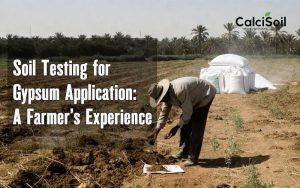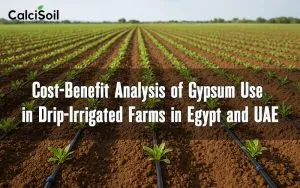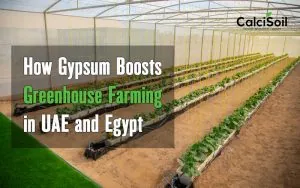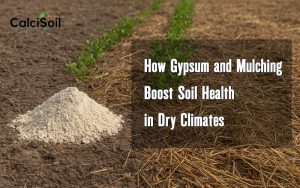
Farming challenges
United Arab Emirates (UAE) faces several farming challenges due to the country’s arid climate and limited water resources. Some of the key challenges include:
Rising Temperatures: Summer temperatures often reach 48°C by mid-July, making it difficult for crops to grow and thrive.
Water Scarcity: The UAE relies heavily on desalination plants for water, which can be expensive and energy-intensive. Additionally, the increasing salinity of groundwater and the limited availability of freshwater pose significant challenges for farmers.
Unpredictable Weather: Climate change has led to unpredictable weather patterns, including droughts and floods, which can damage crops and disrupt agricultural activities.
Soil Salinity: The intrusion of saltwater into the groundwater table due to rising sea levels has increased soil salinity, making it difficult for crops to grow.
Limited Arable Land: The UAE has limited cultivable land, which is mainly used for date palms and other crops. This scarcity of land further exacerbates the challenges faced by farmers.
High Production Costs: The high cost of water, fertilizers, and other inputs makes it difficult for farmers to maintain profitability.
Pest Infestations: The hot and dry climate can lead to increased pest infestations, which can further reduce crop yields.
Food Import Dependence: The UAE imports approximately 90% of its food, making it vulnerable to global market fluctuations and supply chain disruptions.
Water Conservation: The need for water conservation is critical in the UAE, where water is a precious resource. This requires innovative farming techniques such as hydroponics and vertical farming to minimize water usage.
Climate Change Impact: Climate change has led to observable trends such as increased temperatures, water scarcity, and soil issues, which require farmers to adapt and innovate to maintain their livelihoods.
These challenges highlight the need for sustainable agricultural practices, innovative technologies, and government support to ensure the long-term viability of the agricultural sector in the UAE.
One of the most important farming challenges we mentioned, is soil salinity because of saline soil that is the major and base of UAE lands. Here in this article we are going to discuss about this problem and solutions.
Most challenging crops to grow in UAE
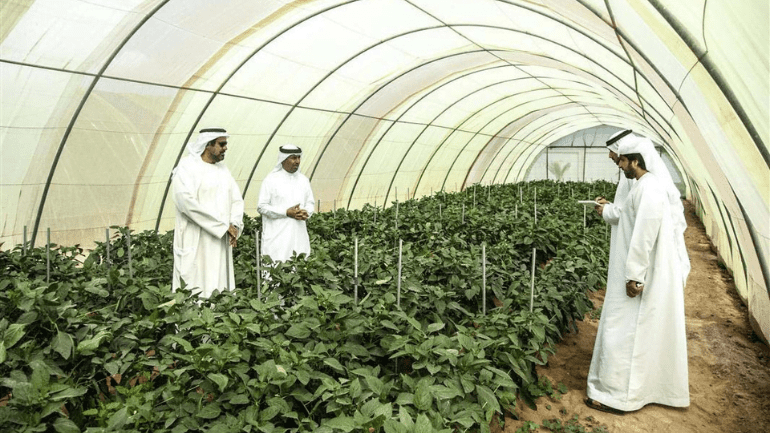
The most challenging crops to grow in the UAE’s climate are those that require specific conditions, such as adequate water supply, suitable soil, and moderate temperatures. The UAE’s arid desert climate, with high temperatures and limited water resources, poses significant challenges to farming. Some of the most challenging crops to grow in the UAE include:
Watermelon: The saltier water in Abu Dhabi has affected the sweetness of watermelons, making them more difficult to grow.
Fruits and Vegetables: The high temperatures and unpredictable weather patterns in the UAE make it challenging to grow a wide variety of fruits and vegetables. For example, Roma Vora, Co-Founder of Aranya Farms, mentioned that the farm is constantly seeking new ways to improve yields and maintain quality due to the changing climate.
Crops Requiring High Water Supply: Crops that require significant water resources, such as rice and sugarcane, are particularly challenging to grow in the UAE due to the limited water availability.
Crops Susceptible to Soil Salinity: Crops that are sensitive to soil salinity, such as wheat and barley, are difficult to grow in the UAE due to the high levels of salt in the soil.
Crops Requiring Specific Temperature and Humidity Conditions: Crops that require specific temperature and humidity conditions, such as coffee and tea, are challenging to grow in the UAE’s extreme climate.
These farming challenges have led farmers in the UAE to adopt innovative techniques, such as vertical farming, precision farming, and using drought-tolerant crops, to overcome the difficulties posed by the climate.
Modern techniques used in UAE for farming challenges
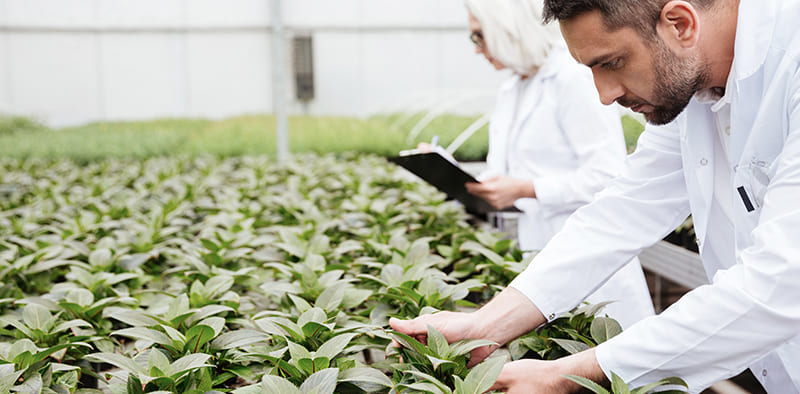
UAE farmers are using several modern techniques to combat soil salinity:
_ Optimizing irrigation by reducing salty water usage, implementing drip irrigation, using desalinated, recycled or rain-harvested water, and avoiding overwatering.
_ Adding organic matter and manure to improve moisture retention and reduce irrigation needs.
_ Avoiding deep tillage and heavy machinery to prevent transferring salts to the root zone.
_ Using cover crops or mulch to protect the soil surface.
_ Increasing drainage for better flushing to remove salts from the soil surface.
_ Planting salt-tolerant crops to manage economic risks and ensure land cover.
_ Mechanically removing salt crystals from the surface.
_ Restoring balance via chemical amendments like gypsum or sulfuric acid.
_ Reducing evaporation with mulch or crop residue.
_ Growing crops that absorb moisture properly to avoid prolonged wetness of lands.
_ Applying fertilizers rationally to avoid promoting salinization through overuse.
Precision farming software like EOSDA Crop Monitoring assists by tracking vegetation health, identifying saline areas, and optimizing fertilizer application to specific zones based on need. Soil salinity sensors and satellite remote sensing are also used to monitor and assess salinity levels.
Organic fertilizer for combating soil salinity
Organic fertilizers play a crucial role in combating soil salinity for UAE farmers by providing a sustainable and environmentally friendly approach to maintaining soil health and fertility. Here are some key points:
Soil Salinity Challenges in UAE: The UAE’s arid climate and high evaporation rates lead to soil salinity, which can negatively impact crop growth and productivity. Soil salinity can be caused by the accumulation of salts from irrigation water, fertilizers, and other sources.
Organic Fertilizers as a Solution: Organic fertilizers, such as agricultural gypsum, can help mitigate soil salinity by improving soil structure and reducing the need for chemical fertilizers.
Benefits of Organic Fertilizers:
Improved Soil Structure: Organic fertilizers help to increase the water-holding capacity of sandy soils, which are prone to rapid drainage and salinity buildup. This is particularly important in the UAE, where sandy soils are common.
Enhanced Nutrient Availability: Organic fertilizers release nutrients slowly, providing a steady supply to plants. This reduces the need for frequent chemical fertilizer applications, which can contribute to soil salinity.
Reduced Chemical Fertilizer Use: By using organic fertilizers, farmers can minimize their reliance on chemical fertilizers, which can exacerbate soil salinity issues.
Additional Tips for UAE Gardeners:
Regular Soil Testing: Conducting regular soil tests helps determine the optimal fertilizer requirements for specific soil types and conditions, including those affected by salinity.
Composting and Mulching: Composting kitchen scraps and yard waste, and applying mulch around plants, can help retain moisture, suppress weeds, and regulate soil temperature, all of which can contribute to healthier soil and reduced salinity issues.
By adopting organic fertilizers and sustainable practices, UAE farmers can effectively combat soil salinity and maintain healthy, productive soil for their crops.
Agricultural gypsum plays a crucial role in combating soil salinity and improving soil health for farming in the UAE. Here are the key benefits:
Soil Salinity Mitigation
Gypsum helps to reduce soil salinity by improving soil structure and reducing the need for chemical fertilizers. It increases the water-holding capacity of sandy soils, which are prone to rapid drainage and salinity buildup.
Nutrient Availability
Gypsum is a good source of both calcium and sulfur, which crops need for good yields. It releases nutrients slowly, providing a steady supply to plants and reducing the need for frequent chemical fertilizer applications.
Improved Soil Structure
Gypsum enhances soil aggregation and porosity, improving water infiltration and air movement. It creates a more favorable calcium-magnesium ratio, overcoming the dispersion effects of magnesium or sodium ions.
Reduced Runoff and Erosion
Gypsum helps to keep phosphorus and other nutrients from leaving farm fields, reducing non-point runoff pollution. It is considered one of the most economical ways to cut phosphorus runoff.
Aluminum Toxicity Reduction
Gypsum can improve acid soils and treat aluminum toxicity, which often accompanies soil acidity, particularly in subsoils. It leaches down to the subsoil, resulting in increased root growth.
By adopting agricultural gypsum in UAE, farmers can effectively combat farming challenges such soil salinity, improve soil structure, and maintain healthy, productive soil for their crops.

